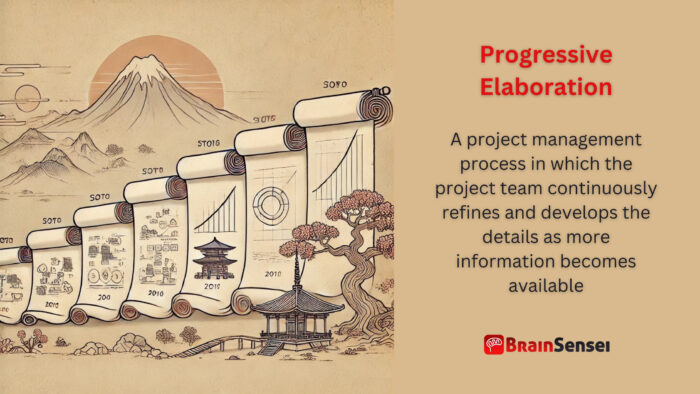
Progressive Elaboration
What is Progressive Elaboration?
Progressive elaboration is a project management process in which the project team continuously refines and develops the details as more information becomes available. This approach allows teams to adapt to evolving requirements, ensuring project plans remain realistic and achievable while responding to stakeholder feedback and changing circumstances.
Key Takeaways
- Continuous improvement and refinement of project details throughout the lifecycle
- Enables more accurate planning and forecasting as information becomes available
- Supports better decision-making through incremental updates
- Helps manage uncertainty and complexity in dynamic projects.
- Aligns with adaptive and iterative project management methodologies like Agile
Understanding Progressive Elaboration
How It Works
Progressive elaboration occurs through iterative cycles, with each phase clarifying the project’s scope, schedule, and deliverables. Initial plans are broad and high-level, gradually becoming more detailed. This approach is essential in complex projects where all requirements cannot be defined upfront.
Key Steps
- Initial Planning: Define high-level objectives, requirements, and constraints.
- Incremental Detailing: Refine tasks, milestones, and resources as the project progresses.
- Continuous Feedback: Incorporate insights from stakeholders, team members, and performance data.
- Adjust and Adapt: Modify plans to reflect new information and evolving needs.
Notes
- Essential in projects with evolving requirements
- Reduces the risk of rework by basing decisions on the most current data
- Supports flexibility and adaptability in project execution
- Requires strong communication channels to ensure alignment across teams
- Often paired with rolling wave planning for iterative scheduling
Related Terms
- Rolling Wave Planning: A technique where near-term tasks are planned in detail while leaving future functions at a high level until closer to execution.
- Scope Creep: Uncontrolled expansion of project scope without proper adjustments to time, cost, and resources.
- Adaptive Project Management: An approach that emphasizes flexibility and responsiveness to change.
- Incremental Development: Building and delivering project components in small, manageable increments.
- Project Scope Management: Defining, controlling, and validating the project’s scope throughout its lifecycle.
- Agile Methodology: A framework that uses iterative and incremental approaches to manage projects effectively.
Examples of Progressive Elaboration
Manufacturing
The manufacturing industry leverages progressive elaboration to develop new production lines or introduce innovative products. For instance, a company planning to manufacture electric vehicles (EVs) might start with a high-level concept focused on battery performance and vehicle range. As the project progresses, the team refines technical specifications, including motor efficiency, charging capabilities, and aerodynamics. This iterative process enables the company to adapt to technological advancements and regulatory changes, ensuring the EV meets market demands and safety standards.
As the project progresses, the team refines technical specifications, including motor efficiency, charging capabilities, and aerodynamics. They develop supplier contracts, manufacturing processes, and assembly line configurations iteratively. Engineers conduct prototype tests, using performance data to fine-tune production techniques. Progressive elaboration enables the company to adapt to technological advancements and regulatory changes, ensuring the EV meets market demands and safety standards.
During the design phase, the team might discover new materials that enhance battery life, prompting an update to the manufacturing plans. Simultaneously, regulatory bodies could introduce new safety standards, necessitating design adjustments. Regular stakeholder meetings ensure that marketing, production, and R&D departments remain aligned throughout these changes.
Real-time feedback also benefits the manufacturing process. Pilot production runs reveal potential inefficiencies, leading to process optimizations. Progressive elaboration helps the company balance innovation with compliance, ultimately delivering a reliable and competitive product.
Healthcare
Progressive elaboration is crucial for implementing electronic health record (EHR) systems in healthcare. An initial project plan may only define broad objectives, such as digitizing patient records and improving information accessibility. As the project unfolds, the team elaborates on system requirements, user interfaces, and data security protocols.
Collaboration with healthcare professionals helps tailor functionalities to clinical workflows. Testing phases reveal practical challenges, prompting adjustments to enhance system usability. Progressive elaboration ensures the EHR system meets legal, technical, and operational requirements, ultimately improving patient care and data management.
For instance, while early discussions may focus on core functionalities like patient registration and visit documentation, later stages involve integrating diagnostic tools and telemedicine capabilities. The project team continuously gathers feedback from doctors, nurses, and administrative staff to refine the interface and improve usability.
Progressive elaboration’s iterative nature also supports regulatory compliance. As healthcare regulations evolve, the system’s security protocols and data-sharing capabilities are adjusted to meet new standards. This process ensures that the EHR system remains secure, efficient, and aligned with industry best practices.
Government Services
Government projects, such as developing digital services for citizens, often rely on progressive elaboration. This iterative process allows the government to deliver user-friendly services while adhering to public sector standards.
Based on residents ‘ and staff’s feedback, they added features like status tracking, notifications, and payment integrations. As regulations evolve, compliance requirements and data protection measures are also detailed. This iterative process allows the government to deliver user-friendly services while adhering to public sector standards.
In the initial stages, the project team outlines core functionalities based on high-level objectives like efficiency and accessibility. Subsequent workshops with public officials and residents highlight additional needs, such as multilingual support and mobile accessibility. Each feedback session informs incremental adjustments, ensuring the platform meets diverse user expectations.
The progressive elaboration approach also facilitates risk management. As technical challenges emerge, the team adapts workflows and allocates resources accordingly. Continuous communication with legal advisors ensures the system complies with privacy laws and accessibility standards. Ultimately, the iterative process results in a robust, inclusive, and user-centric digital service platform.
Use Cases of Progressive Elaboration
Canada (Infrastructure Development)
Progressive elaboration is evident in large-scale infrastructure projects like Canada’s public transit expansions. Initial project plans may outline primary routes, estimated costs, and potential contractors. Over time, more detailed studies determine station locations, environmental impacts, and service schedules.
For example, during Toronto’s subway expansion, feedback from community consultations led to design adjustments. Engineers used progressive elaboration to integrate advanced signalling technologies and sustainable materials. The process ensured the transit system met long-term urban development goals while addressing community concerns.
The complexity of such projects requires ongoing communication and iterative adjustments. Engineers revise construction techniques to ensure structural integrity as geological surveys reveal soil inconsistencies. Station layout adjustments accommodate accessibility requirements, while the estimators refine cost estimates based on supplier bids and market conditions.
The project team also employs progressive elaboration to navigate regulatory challenges. Collaboration with city officials and transit agencies helps integrate new safety standards and environmental regulations. Regular progress reviews keep stakeholders informed and aligned, ensuring the final infrastructure meets operational, safety, and community needs.
Europe (Renewable Energy)
European wind farm projects illustrate progressive elaboration through incremental planning and execution. A renewable energy company may select a general site based on wind patterns and land availability.
As feasibility studies progress, the team refines factors like turbine types, grid connections, and environmental impacts. Collaboration with regulatory bodies and local communities provides insights into necessary adjustments. Progressive elaboration helps align project execution with energy production targets and sustainability standards.
The planning phase might initially estimate power output based on historical data. As turbine manufacturers provide updated specifications, the team revises the forecasts. Environmental impact assessments introduce new considerations, such as bird migration patterns and noise pollution, prompting design alterations.
Stakeholder engagement remains critical throughout the process. Community feedback influences site layouts to minimize visual and acoustic disturbances. Financial models are updated to reflect tax incentives and energy pricing policy changes. This refinement ensures the wind farm delivers reliable, cost-effective, and community-supported renewable energy.
Asia (Telecommunications)
In Asia, telecommunications companies deploy 5G networks using progressive elaboration. Initial plans may define coverage goals and core infrastructure.
Subsequent phases elaborate on equipment selection, tower placements, and network optimization. Continuous performance assessments lead to adjustments in signal distribution and technology integration. Progressive elaboration ensures efficient resource allocation and optimized network performance.
The initial rollout typically targets high-demand urban areas, with later phases extending coverage to suburban and rural regions. Network performance metrics guide iterative enhancements, such as adjusting antenna orientations and upgrading hardware components.
Regulatory requirements also evolve throughout the project. Telecom providers collaborate with government agencies to align network designs with spectrum allocation policies. Customer feedback influences service offerings, prompting adjustments to data plans and application support. Progressive elaboration ensures the network remains competitive, reliable, and compliant with industry standards.
Best Practices for Progressive Elaboration
Project managers should establish clear objectives and flexible processes to implement progressive elaboration effectively from the start. Communication is fundamental, requiring regular stakeholder meetings to share insights and align on changes. Employing project management software helps track iterative adjustments, providing a transparent record of decisions and progress.
One essential best practice is maintaining a well-documented change control process. As new information emerges, having a formal procedure ensures that the project team can evaluate changes for impact before implementation. This process prevents hasty decisions that compromise scope, budget, or timeline.
Risk management should also follow a progressive elaboration approach. Conducting frequent risk assessments allows teams to identify potential issues early and develop mitigation strategies. For example, continuous user feedback in a software development project can highlight security vulnerabilities that require immediate action.
Training and development are equally important. Teams should be familiar with iterative planning techniques and equipped with tools to manage evolving requirements. Cross-functional collaboration enhances the effectiveness of progressive elaboration by integrating diverse perspectives into the planning process.
Lastly, encouraging a culture of adaptability supports the dynamic nature of progressive elaboration. Teams that embrace change as part of the process can respond more effectively to unexpected challenges, ultimately contributing to project success.
Common Mistakes and Issues
While highly effective, progressive elaboration presents several challenges and potential pitfalls that project managers should be aware of. One common mistake is underestimating the importance of initial planning. While progressive elaboration allows for adjustments over time, a solid foundation with clear goals, objectives, and constraints is essential to guide the iterative process.
Another frequent issue is scope creep, which occurs when initiators introduce changes to the project without proper evaluation or documentation. Without robust change management protocols, project teams may implement new features or requirements that strain resources and disrupt timelines. Project managers should establish clear procedures for evaluating and approving changes to mitigate this, ensuring alignment with overall project objectives.
Communication breakdowns also pose a significant risk in progressive elaboration. As plans evolve, stakeholders must remain informed about changes, decisions, and the rationale behind adjustments. Inadequate communication can lead to confusion, duplicated efforts, and decreased stakeholder confidence. Regular status meetings, detailed documentation, and accessible communication channels help maintain transparency and alignment.
Furthermore, resistance to change can hinder the effectiveness of progressive elaboration. Team members accustomed to rigid planning structures may struggle to adapt to an iterative approach. Training on the principles and benefits of progressive elaboration can foster a more flexible and adaptable mindset within the team.
Lastly, inadequate documentation of incremental changes can make it challenging to track project progress and understand the rationale behind decisions. Project managers should implement standardized documentation practices to record changes, decisions, and lessons learned throughout the project lifecycle. This historical record supports accountability and serves as a valuable reference for future projects.
Frequently Asked Questions (FAQs)
What is the purpose of progressive elaboration in project management?
Progressive elaboration helps teams refine project details as new information emerges, improving planning accuracy and decision-making.
How does progressive elaboration relate to rolling wave planning?
Rolling wave planning applies progressive elaboration by detailing near-term tasks while keeping future tasks broad until more information is available.
Can progressive elaboration lead to scope creep?
Yes, if not managed correctly. Clear scope definitions, change control processes, and stakeholder communication can mitigate this risk.
Is progressive elaboration only used in Agile projects?
No. While common in Agile, it is also valuable in traditional project management, especially for complex and uncertain projects.
What are the benefits of progressive elaboration?
It enhances adaptability, improves planning accuracy, and facilitates better stakeholder engagement throughout the project lifecycle.
Additional Resources
Preparing for a PMI certification?
- Exam Prep Courses: PMP®, CAPM®, and PMI-ACP®
- Exam Simulators: PMP®, CAPM®, PMI-ACP®, PMI-PBA®, PMI-RMP®, PMI-SP®, PgMP®, and PfMP®
- Professional Development Units (PDUs): 15, 30, and 60 PDU Bundles



